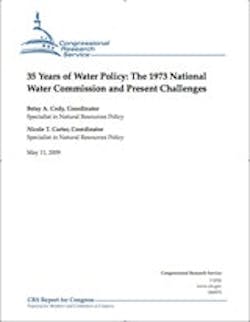Report Examines Past, Future of Water Policy
Betsy A. Cody and Nicole T. Carter of the Congressional Research Service of the Library of Congress have released a report titled 35 Years of Water Policy: The 1973 National Water Commission and Present Challenges, which presents a summary of the 1973 report, Water Policies for the Future, and how the issues contained therein have evolved since its release.
These issues are especially relevant as Congress considers the establishment of a “Twenty-First Century Water Policy Commission.” The new report covers attempts to unify and coordinate water policy, and why that is so difficult.
The Summary states:
“While many support better coordination of federal water activities and a 'clearer' national vision for water management, Congress has not enacted overarching water policy legislation since the 1965 Water Resources Planning Act. Instead, water policy has largely evolved through executive and judicial actions, in many cases in response to piecemeal legislation. Congress continually modifies federal water projects through amendments to existing projects and programs through Water Resources Development Acts (WRDAs), Reclamation acts, water quality legislation and appropriations decisions. Incremental and ad hoc evolution of water policy, however, is not surprising. Water management is complicated by past decsions and investments affecting a wide range of stakeholders pursuing different goals. Specifically, federal and state laws and regulations, local ordinances, tribal treaties, contractual obligations and economies dependent on existing water use patterns and infrastructure all affect water management. Attempts to untangle such complexities involve many constituencies with differing interests, and success is difficult to acheive. Expectations for a commission to achieve change in a complex system resistant to transformation may be unreasonable; instead, the influences of a commission may lie in how its recommendations combine with other drivers to support policy evolution.”
The report is available here.
Source: Congressional Research Service
